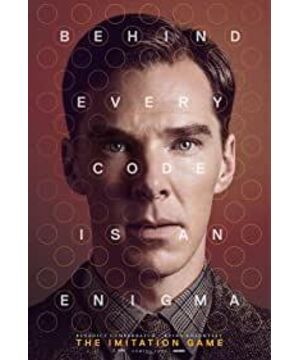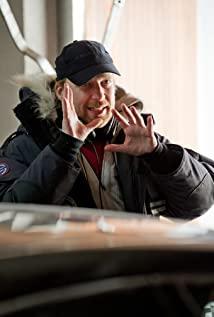Biographies of figures like Turing are a treasure trove for filmmakers: such a genius, such a high achievement, such a "unique" that cannot be accommodated at the time, and such an ups and downs of history recognized by the world...
The film uses three timelines to connect a character with logic and thickness: in 1951, he was targeted by the police due to theft from his home, which led to the investigation line of indecency; he was recruited into the army at the beginning of World War II to solve the "mystery" line; Bullying, getting acquainted with christopher and realizing that he loves him... The three lines are naturally connected by memories or interludes with a causal relationship, not chaotic.
Layer 1: Machines, imitating people
The imitation game is another way of saying the Turing test: the tester is isolated from the subject (a person and a machine), and the tester judges whether the opposite is a human or a machine by asking questions. If 30% of the testers think that the opposite is a machine, then congratulations that the machine has passed the test and has artificial intelligence.
In the movie, Turing created a machine called christopher to crack the German code. It was named after the "first love" who had a heart-to-heart connection with him, helped him on campus and gave him a book on cryptography to light up his wise life. The memory of Xiao Ke who died young...
The second layer: people and people are different
The movie portrays Turing as a genius with high IQ and low EQ, which makes viewers who are familiar with Turing's life very uncomfortable. Whether the movie is finally the life of a character or not, the director wants to show how different people are. A classic line Recurrence: Sometimes it's the very people who no one imagines anything of who do the things that no one can imagine.
It is true that most of the human beings are so ordinary, thinking and acting like all living beings, but there are some individuals who can jump out of it and change the world in a creative way; it is precisely because of their "different" that they are often out of tune with the world at that time. .
The third layer: Since people are so different from people, why should machines not be recognized because machines are different from people? Or that's just another different, unrelated species
-It's about cryptography.
-Like secret messages?
-Not secret. That's the brilliant part.
Messages that anyone can see, but no one knows what they mean unless you have the key.
-How's that different from talking?
- Talking?
- When people talk to each other, they never say what they mean.
They say something else, and you're expected to just know what they mean. Only I never do.
So, how's that different?
In the movie, the conversation between little Turing and Christopher about deciphering the code is like deciphering the real intention behind people's communication, which is impressive.
Language is a set of codes that need to be deciphered. Is it hard to break a code? For Turing, it's the same as understanding what people mean.
Of course machines...can't think as people do.
A machine is different...from a person.
Hence, they think differently.
The interesting question is, just because something, uh, thinks differently from you, does that mean it's not thinking?
Well, we allow for humans to have such divergences from one another.
You like strawberries, I hate ice-skating, you... cry at sad films, I... am allergic to pollen.
What is the point of-of different tastes, different... preferences if not to say that our brains work differently, that we think differently?
And if we can say that about one another, then why can't we say the same thing for brains... built of copper and wire, steel?
This is an essential problem: to be classified because of differences is the way humans understand the world to make the world orderly; when this classification is fixed, it is easy to form a set of privileges and make more undiscovered diversity lose its color. . Yes, human beings are not supreme, at a higher level, from a different perspective, you will see the vast world!
View more about The Imitation Game reviews











